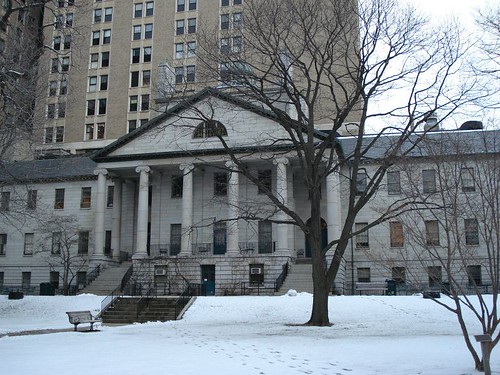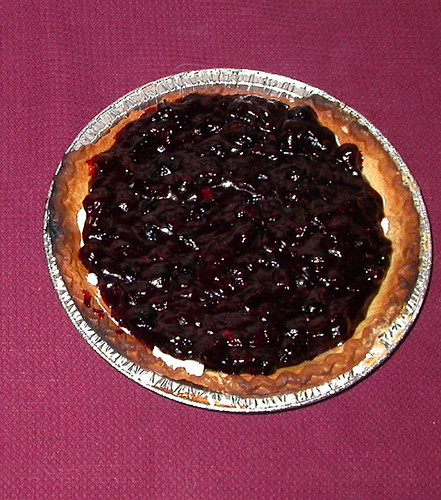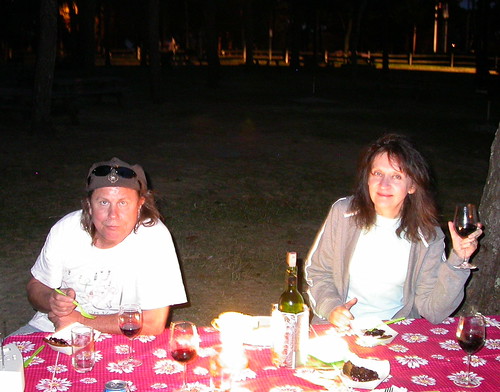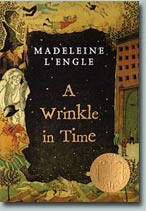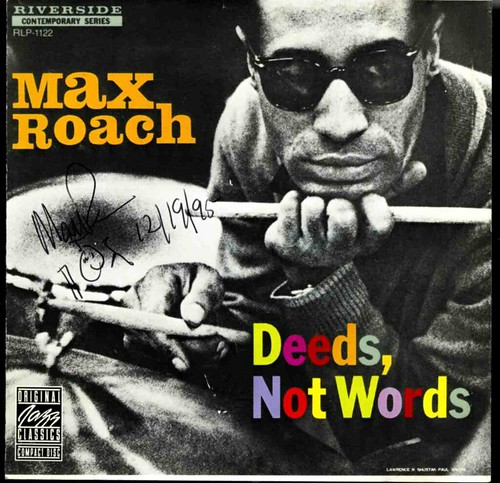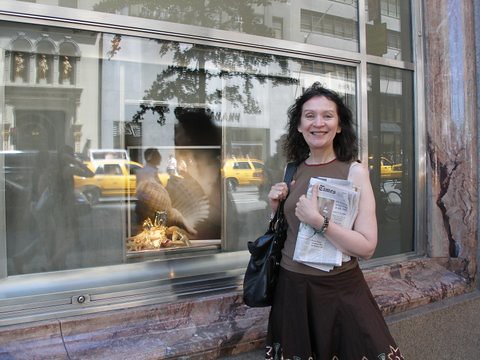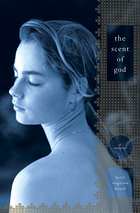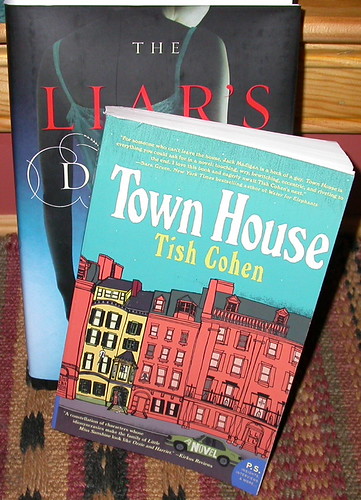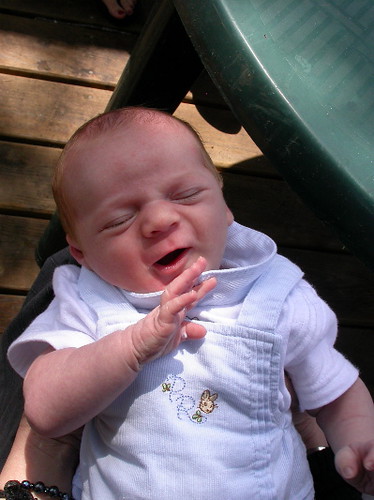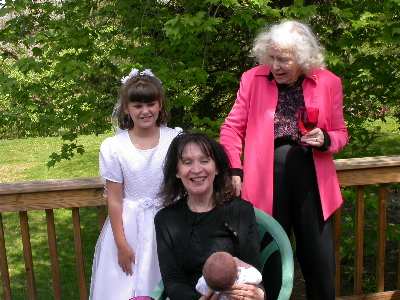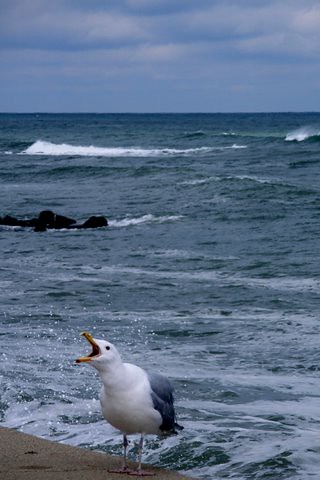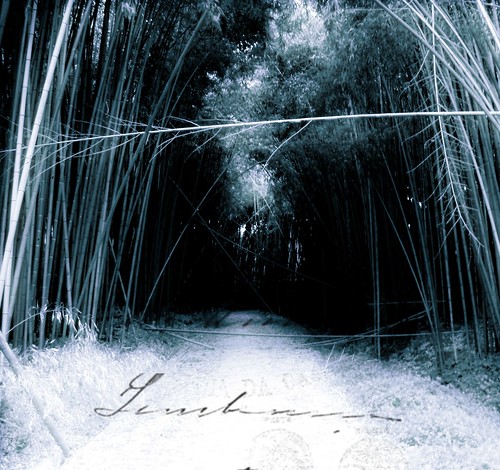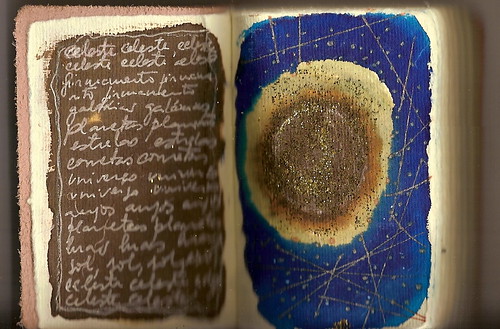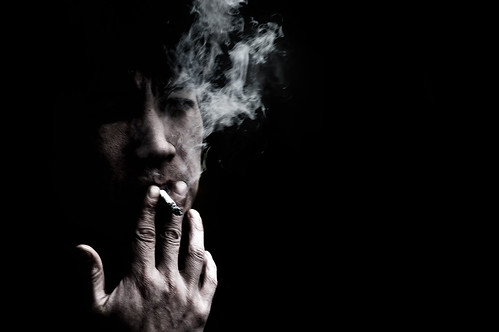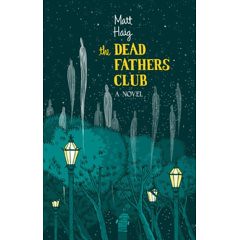When I was admitted to the hospital for my second surgery, my middle-aged roommate immediately turned her face from me. "Pull the curtain!" she instructed my nurse in a surly tone.
I quickly decided that the closed curtain was fine with me. I had no need to admit such an unpleasant person into a life that felt, at that moment, difficult enough.
However, after Ted left, it became harder to ignore the woman behind the curtain. She argued noisily with her boyfriend on the phone, then slammed down the receiver. When she refused to answer his repeated calls, her angry, self-satisfied refusal--and the constantly ringing phone--jangled in the space between us.
"Get me something to eat!" she bellowed to the front desk, after ringing her call light.
However, when the aide appeared with the liquid diet I knew all too well, she was infuriated.
"I said I wanted something to eat--not this shit."
"It's what your doctor ordered," the aide explained, politely setting down the tray.
"Then get the order changed, and bring me a goddamn turkey sandwich--on white bread!" my roommate railed. I expected the unnaturally green jello and the broth to hit the wall at any moment.
But to my amazement, within a half hour," the woman who said no" had been served another meal--including a turkey sandwich on white--just like she ordered it.
"What idiot brings a turkey sandwich without mayo?" she said, in place of thank you. The aide and I exchanged a look
But a moment later, the mayo appeared.
In the course of the day, I heard my roommate say no to the boots that stimulate circulation after surgery. "They're effing hot. You wear them if they're so great," she yelled at the nurse.
She also refused to get up and walk, though the nurses repeatedly and patiently explained how important it was for her healing. Eventually they stopped asking.
I pretended the curtain between us was as thick as the Berlin Wall. On my side, I read, talked with my family on the phone or with the nurses I'd come to know in my first visit to the floor, and tried not to think too much about what would happen the next day.
But at three in the morning, I broke.
My roommate had called for pain medication in her own imitable way. But once again, she was unhappy with what her doctor had ordered.
"No Percocet!" she shouted. "I want Dilautid!"
Assuming, as I often do, that "orders" are unimpeachable, I figured we both were in for a long night after she refused the Percs. She had already begun to moan with theatrical gusto.
A short time later, the nurse returned with her drug of choice.
Well, that did it. It was three in the morning, and my roommate obviously had no desire to speak to me, but I couldn't remain silent.
"I have to admire your ability to say no," I said--and in many ways, I meant it. "I thought the only possible answer around here was 'okay.'"
"Yeah, I been listening to you," she snorted. "I bet you've been walked on your whole life."
Hmmm...I contemplated that.
Then she asked me about my upcoming surgery. Apparently, our lives had permeated the curtain more than either of us cared to admit.
"I'm cancer free for over a year," she said. "I beat it and you can, too--if you stop being such a wimp."
I contemplated some more...
The next morning, just before my surgery, the nurse came in and said she was being discharged.
"What if I'm not ready to go?" she asked.
"I'm sorry," the nurse said. "Do you have clothes to wear home?"
"No, I came to the hospital naked," my roommate snapped and turned her back.
Only after the nurse left did she begin to cry. She was still in a lot of pain, she said; and there was no one at home to take care of her.
She rang the call bell repeatedly, complaining about pain, an inability to stand or make it to the bathroom. She couldn't possibly go home; she wouldn't.
A short time later, the orderlies came to wheel me to surgery. Since her back was to the wall, I assumed my roommate was sleeping.
But just as I reached the door, she called out to me. "Hey, good luck, okay?"
I thanked her and told her I would see her when I got back.
However, when I came in from the recovery room, her bed was made up and empty as if she'd never been there.
I continued to think about her though--about the power and limitation of the "no" she used so frequently. I wondered what her life was like, and if she really had no one at all to help her out.
And though I did not envy her life, I learned something from her. On my last day in the hospital, the nurse came to give me one of the painful heparin shots I'd been receiving twice a day.
Their purpose is to prevent blood clots. And since I was taking long, frequent walks in the halls (wanting to see the Charles River!) I didn't really think I needed them.
"What if I said I didn't want it?" I asked the nurse, covering my arm with my sleeve. "What if I just said 'no?'"
"You could do that, I suppose," the nurse said, withdrawing the dreaded needle. "I'll mark you down as non-compliant."
Non-compliant. It's something I've rarely been called, but on that morning, it felt like an unexpected victory.
You do not need to leave your room. Remain sitting at your table and listen. Do not even listen, simply wait, be quiet, still and solitary. The world will freely offer itself to you to be unmasked, it has no choice, it will roll in ecstasy at your feet. --FRANZ KAFKA
Sunday, December 30, 2007
The Woman Who Said No
Wednesday, December 26, 2007
THE VIEW FROM MY WINDOW (Hospital Thoughts 3.)
This was the view from my room during the second week I spent in the hospital. To the left, I could also see the Tobin Bridge. When I walked the long hall to the other side of the building, which I did as soon as I was able, I could see the Charles River, slowed by glittering ice floes, and beyond it Boston's gritty, elegant skyline. Since I was a child, the sight of that skyline has always excited me, and it still did. But this time it had become a kind of moving picture--one I could see, but could not enter. I looked on it--and on my own recent active, happy life--with nostalgia and awe.
In the moving picture outside the hospital, people navigated the badly plowed streets and sidewalks on their way to work. They went through the motions of holiday shopping with the usual joy and frustration. They ducked into Starbucks across the street for a respite from the cold, or grabbed a drink at the Harvard Gardens. Ted and I had stopped there one afternoon after a particularly grueling appointment. The french fries were deliciously crispy and there was jazz on the stereo.
Inside the hospital, a different kind of life went on. The second night I was there, they wheeled in a new roommate. She had been hit by a car in the crosswalk of a city street, and had several broken bones. It took thirty-six hours before an operating room was available to repair her badly shattered ankle.
Though she was Chinese, and there was something of a language barrier between us, we became a great consolation to one another. Late at night, when they finally turned out the lights, we would share our litany of suffering, taking turns in the dark. We didn't so much complain of our pain, as speak of it with wonder.
Weren't we supposed to be outside, among the crowd in the street? Weren't we part of the moving picture that is life? How had we landed here? Surely, there was some mistake.
Every night ended with the same question. "Why are we suffering?" my roommate would ask.
"I don't know," I'd say. "But we just have to accept it."
The last night I was there I was almost asleep when she asked her question. I was too tired to respond, but she no longer needed to hear my voice. I had begun to coast into a dream when I heard her answer herself three times.
Don't know; just have to accept.
Don't know; just have to accept.
Don't know; just have to accept.
In her voice, the words sounded like a kind of poem, the limited human answer to so much of the mystery that is life.
Outside, the snow continued to fall, and people continued to travel through the moving picture in the street, eager to get where they were going. My friend and I, temporarily stopped by pain and indignity and tedium, were them. And they, whether they knew it or not, were us.
It's something I hope I don't forget.
Thursday, December 20, 2007
UPDATE
Many thanks and much love to everyone who has sent good wishes, cards, prayers, and gifts. I hope to be home and up to writing more on Saturday afternoon.
BLISS to all as you celebrate the holidays!
Sunday, December 09, 2007
2. On Homesickness
Every night in the hospital, a member of the housekeeping crew would stop in my doorway to chat. His subject was homesickness, a topic that was particularly resonant for me, since I, too, was longing for the familiar clang and clatter of home.
My friend was from Colombia. He'd been in the U.S. for twenty-two years and his children had been born here. Still, when he went to sleep every night, he dreamed of his old home in Medellin, a place he could only afford to visit every few years.
"Every night for twenty-two years!' he emphasized.
But wasn't Medellin home of the drug cartels? One of the most violent cities on earth?
"No!" he insisted, the violence had abated in recent years; and besides, that had never been his Medellin. His city was the city of eternal spring where the weather is always magnificent. His city was the place where neighbors sat on their stoops and laughed together at night, a place where street festivals lasted all night, and everyone--young and old--came out to dance.
His Medellin was a place where colors were brighter, where food had more taste, and you couldn't walk through the neighborhood without hearing the sound of music.
He spoke so passionately about his lost home that for three nights I dreamed I was there, dancing all night at a street festival, wandering through neighborhoods transformed by vivid color and music.
But on the fourth night, when he stopped to talk about how much he missed his family, how a brother had died while he was away, and he'd never had an opportunity to attend the funeral, my own homesick dreams also took a turn.
That night I dreamed of my first home, of the trees outside the closet-sized room with the pink rose wallpaper where I spent my childhood, and the scent of lilac in the spring. In the next room my parents argued and loved, dreamed and worried. Our lives there, now vanished, seemed as solid and indestructible as those tall oaks and catalpas outside my window. When I woke up, the feeling of being in that house were so real that it seemed impossible that I could never return. That it had become a lost kingdom.
My last night in the hospital I watched for my friend from Colombia, but he didn't appear. Apparently, it was his night off. He was probably spending it at home with his wife, and with the daughters who considered the U.S. home--the oldest one a nursing student, the younger one earning straight As in private school. For them, my friend said, he had given up his home.
Still my homesick dreams continued. But this time they were filled with the sounds and colors of the life I live now: my daughter coming in from her student teaching every day, tired but full of stories, my son's inexhaustible guitar, ordinary days spent writing, and hanging laundry, and having dinner with Ted. My own version of the "place of eternal spring"--even in New England winter.
The next day I was released to that old life, but with a new sense and appreciation for its precariousness, its preciousness, with a new sense that even this beloved time and place will one day be a house where the door is locked to me forever.
Thursday, December 06, 2007
TEN THOUGHTS FROM THE HOSPITAL

The Garden of Shimmering Peace, originally uploaded by patryfrancis.
1. THE RELEASE FORM
As I went through a series of tests after my diagnosis, I promised myself I would not fear surgery. Surgery meant bright yellow, high flying hope. "No surgery" on the other hand (at least, in my case) meant "no point." And truthfully, I didn't fear the operation. Though I was given valium and told that no one sleeps the night before surgery, this lifelong insomniac slept deeply and well. I rode to the hospital in a state of calm anticipation
In pre-op, I was prayed over by the chaplain; and when Ted came in to say goodbye to me, there was something I can't describe-- a depth in his eyes--that I'd never seen before in twenty-six years. Something had changed between us because of this crisis; something had grown.
But it wasn't until my bed had been parked outside the OR and someone realized I hadn't signed a release form that I really contemplated what was about to happen to me--and my own vulnerability before it. As the anesthesiologist read the lists of risks--beginning with a dislodged cap in a tooth when the breathing tube was inserted and culminating in death, I hesitated, pen in hand.
"Well, are you going to sign?" the anesthesiologist asked.
"I'm thinking about it," I said. Then we both laughed. As if I had an option...
But the truth was I really did think about the possibility that when I went under, I would never wake up. It may have been remote: I was relatively fit, the hospital was world class, and I had full confidence in my surgeon. Still, it was there.
And in that moment of hesitation, I decided that if it happened, I was ready. I don't mean that in a negative, defeatist way. No, I desperately wished for more days and minutes and years--and what's more, I believed I would have them. But if I were to die that day, I was prepared. What that meant for me was quite simple: I was at peace with everyone in my life (not always possible, I know, and not always true for me.) In the previous week I had given my "I love you" to everyone in my world freely and often. I'd also spent a lot of time in contemplation.
The moment of hesitation passed. I signed my name. Then the door to the operating room swung open and I encountered the huge probing lights, the sterile atmosphere, the masked surgical team. It might have been the last thing I remembered, but it wasn't...
And yet, my moment spent contemplating the risks of surgery remained with me. I wonder: if each of us had to sign a release form every day before we left the house, enumerating the dangers we might encounter, beginning with missed opportuntunities to love, extend kindness, smile at a stranger, or pursue our goals, and ending with death--all very real possibilities we face every day, would we be ready? Would we change the way we lived?
Sunday, November 25, 2007
TWO OUNCES OF BLISS

1/2 full, originally uploaded by *davidsαngle.
Three weeks ago I was diagnosed with an aggressive form of cancer. Then the news got worse: a cat scan revealed spots on my liver, a possible metastasis.
So how does a lifelong neurotic and avowed hypochondriac deal with that kind of news? Initially, not too well. The day I got the scan results I went home, drank too much wine, cried, yelled at the wonderful husband who was as anxious as I was, and avoided calls from friends and family members. I preferred to sit in the dark and drink my misery to the last drop; thank you very much.
But the next morning I woke up in a different frame of mind. It was a bright November morning; I had work I love to do; and after only twelve hours, I was already tired of my own despair and fear. I couldn't change the fact that I was ill; I couldn't make the road ahead pain or anxiety free, but I could get out of bed and take the dogs to the beach. I could pick up a common, translucent shell and hold it up to the light until it revealed just how uncommon it was. Then I could put it in my pocket and take it home to remind me--just in case I forgot.
Fortunately, last week an MRI revealed no sign of metastasis; and I'm optimistic about my surgery next Thursday. Still, it's been a difficult time. The other night I was watching a British movie called Greenfingers. In it, a character says, "You have to learn to make adversity your ally." I knew exactly what he was talking about. I may not be ready to call adversity my ally yet, but it is certainly my teacher.
One thing I learned was that for every ounce of trouble I was forced to drink, I would counter it with two ounces of bliss. Not the cheap bliss I attempted to find in a wine bottle, but the real thing. The kind I saw in that thin shell when I held it up to the light. The kind we all have inside us if we choose to draw on it.
I really think this is where we so often go wrong . When bad things happen--whether it's disease, rejection, mistreatment, percieved or otherwise--we allow it to control us. In other words, we pour ourselves another glass of poison when what we really need is the antidote--a double shot of BLISS!
My grandfather, who I called John, said it more succinctly: "No kick." (Translation: No complaints.) I've written about his two word exhortation here and elsewhere, but it has never meant more to me than it does right now. When asked to expand on his philosophy, he said, "Once you give in to complaining, you're all done."
Well, John, I'm not done yet.
Peace and love to all--
*The luminous photograph entitled "1/2 Full" was done by a particularly talented photographer named David Michael. I spent a good hour this afternoon enjoying his innovative images on Flickr, and hope others will do the same.
Wednesday, September 12, 2007
THIRD ANNUAL LITERARY BLUES PIE
It's that time of year when my friend, Susan Messer and I bake a pie for our muses. Well, actually, it's past time. But after all these years of hanging out with writers, the muse must be used to procrastination...and good intentions...and well, flakiness.
Susan, who baked her gorgeous pie early wrote this about her efforts and her current literary state:
"This is the second blueberry pie I've made this summer, as I'm especially anxious to be in touch with my muse and have her, in turn, cast any literary spells she can. My first novel is currently on submission. I dreamed last week that my agent called me to say she had an offer from Home Depot. "Home Depot?" I responded. "I didn't even know they published books." While it was nice to have an offer, it wasn't exactly what I'd had in mind."
I was particularly excited when Diana Guerrero and the Fawnskin Authors baked their pies even before I realized the season was upon us or noticed that blueberries were suddenly everywhere.
The muse and I have struggled mightily this summer. In the spring, things were looking great! I wrote up a synopsis to a new novel and sent it around to a few friends. All agreed: it was brilliant, complete with rich characters, a dazzling plot, and a couple of intriguing subplots to keep things going. This one was practically going to write itself.
All I planned to do was sit in my summer office and take dictation. I'd even bought myself a new instrument, as the astute Sally Crawford called it here in the comment section. And it really felt like that: something unique and fine, something that if handled with the respect it deserved would produce the music I heard in my head--a simmering tale that would make readers everywhere--or at least one or two of them--see a little corner of the world in more vivid colors.
I wrote 80 pages. It was good, I told my agent. I was humming, I told my husband, my kids, my writing friends. I could hardly wait to show them the brilliant manuscript that grew daily under my clattering fingers.
And then abruptly, I came to a particularly lonely spot in the road, well known to all writers. There's only one sign on that road, but instead of offering direction, that sign is emblazoned with a huge, taunting question mark. I didn't know where I was going. Even more fatal, I had no idea why I'd ever set out on this particular journey.
But not to worry. This happens in the writing life, right? I started again. This time I got to page 103. I was so excited by my progress I couldn't wait to finish. I had to share it with my agent right now. I e-mailed what I optimistically called "the first third of my novel" to her on a Friday, and by Sunday, I was in despair. Not because I hadn't heard from her, but because I already knew what she was going to say. I knew because in my truest heart, I thought the same thing. On Monday, she called and said it.
On Tuesday, darkness descended. I mooned around in my pajamas, shades down, living on chocolate and wine. Even the house plants wilted. I watched dreary afternoon TV, and scanned the paper for waitressing jobs. There weren't even any of those. I wasn't sure how I'd ever written a coherent blog post, or a slightly witty e-mail, never mind an entire novel. Only one thing was clear: I couldn't do it again. I drank more wine, and refused to turn on the lights when night came.
But on Wednesday, I leaped out of bed, filled with irrational enthusiasm, and new certainty. While I'd been mooning, the subconscious mind (rumored to be a close friend of the muse) had been working on the problem. What's more, she was fired up with a new idea. Before I'd even buttered a piece of toast, I was back in my summer office, birds singing, dogs at my feet, ready to play my instrument as it had never been played before. I knew exactly what was wrong with my wimpy character, my flaccid plot, and what's more, I knew how to fix them.
In the coming weeks, I wrote another 126 pages before I saw it wavering in the distance. No, it can't be! I said, trudging on for two more pages. I refused to look. But by then, the sign with the huge question mark in the center was the only clear thing on my horizon. I was on page 128 and I was lost. Utterly and hopelessly lost. Again.
So what do you do when you've written a total of 316 pages (a whole novel!), when you've spent your entire summer sitting on the deck trying to play an instrument that remains resolutely tuneless? What do you do when you're out of ideas, and you seriously don't know if you'll ever write again, when the bills need to be paid, and your waitress shoes are hanging in your garden, bloated with a season's worth of rain and a lifetime of dreams?
Well, if it's August, you make a pie, of course! Not just any pie, but a pie that has it's own history of literary magic. That's right, you make a Literary Blues Pie. (Recipe here)
As you can see from the photo above, my friend and pie-baking cohort, Susan, baked a pie of rare perfection--from the crisp pate brisee to the lovely presentation.
The two pies I made, on the other hand, were as messy and flawed as my life, my summer, my attempt to write a new novel. The oven doesn't work right so the crust burned; and I decided to experiment with the cream layer, only to realize the old adage about not messing with perfection. But since they don't get too many homemade pies around here, my family gobbled up the first pie. And when I shared the second one one night at Veteran's Beach with my friends, Laura and Jake (who brought a good bottle of Pinot Noir to further tempt the muse) they even asked for the recipe.
(Pie and Pinot Noir at the beach)
Then, I took a week or two off, and called my son, Josh. Josh isn't a writer; nor does he read much fiction, but he's an excellent listener. He asked me how the novel was going, so I told him.
"Sounds like you're over-thinking it, Mom."
A few days later, I began again, this time with Josh's words in mind. Instead of going back to polish my words on a daily basis, I began to write the way I had made my pie. I didn't worry that the temperature might be off, or that my corn starch was lumpy or that I might be a quarter cup short of blueberries. I just worked with what I had, and did my best. I didn't overthink.
So far I've got 30 new pages and no road signs in sight. But I'm such an optimist, I've even installed a meter:
Saturday, September 08, 2007
THE DIVINE MADELEINE L'ENGLE
“Why does anybody tell a story? It has something to do with faith, faith that the universe has meaning, that our little human lives are not irrelevant, that what we choose or say or do matters, matters cosmically.”
And when the Divine Madeleine told a story, it did. What better epitaph could a writer--or indeed any human being-- ever have?
Friday, August 17, 2007
MAX ROACH, LEGENDARY JAZZ DRUMMER...and my teacher: January 10,
One reason it took me such a long time to finish college--or for college to be finished with me--was that I couldn't seem to focus on my requirements. I was supposed to be a "Communication Studies" major(my idea of a practical use for my writing obsession). But every semester, the listings in the English department called my name. What choice did I have but to answer, to follow, to extend my stay at the university just a little longer?
Then there were the dance classes--at least one each semester. I must have been the klutziest student in ballet. Invariably, when the class moved one way, I drifted in the opposite direction. (A metaphor for my life, maybe?) But that didn't keep me from taking the beginner's class again and again, enjoying the feeling of being regal, disciplined, graceful--if only in my mind.
I was also drawn to languages. Each felt like a personal invitation to travel in a way that even I could afford. I immersed myself in Italian and French, and even tried Chinese--though it rapidly proved too demanding for an uncommitted dilettante who was looking for a trap door to the culture. Eventually, I found that door, as well as many interesting friendships, in the Asian Studies department. Meanwhile, my adviser wanted to know if I had satisfied my science requirement yet. Um, maybe next semester? I said sheepishly.
However, when I heard that music giant, Max Roach was teaching his first course in "The History of Jazz," I scratched Zoology 101 from my schedule. Honestly, I didn't expect to be admitted. I figured the class would be overrun by music majors, and I'd still have time to sneak into Botany or Astronomy at the last minute.
But to my surprise, only twenty students signed up to spend a semester with a legend; and to my eternal good fortune, I was one of them. The class turned out to be one of the most memorable experiences of my excessively varied and academically checkered college career.
Every Tuesday and Thursday afternoon at 2:20, we sat in a little room and listened to Max talk about jazz. He also talked about his life, which it turned out, was pretty much the same thing. Nearly every one of the musicians whose music streamed into the hallway, cajoling us inside with the wild notes from their saxophones or the rhythms of Max's drums, and altering the atmosphere of the University in subtle and not so subtle ways was someone he knew, someone he'd played with or learned from, or watched come up.
I can see him now--a trim man in his fifties, always in a well-tailored suit--leaning against the desk, as he turned the history of America's original art form into a personal story, one filled with humor and excitement and vibrant life--but also great tragedy. When he talked about the death of Charlie Parker, there were not only tears in his eyes, they glistened in the eyes of every student in the class.
But Max's class was not just a History of Jazz; it was a history of African Americans in the twentieth century. He told us about playing in hotels where he wasn't allowed to stay; and of the many composers who'd sold their music for almost nothing, only to see white musicians become wealthy by recording it. There was no bitterness in Max's telling of the past he'd lived, but there was no sugarcoating it either. Change had come, but there had been a long, hard price for it. It needed to be spoken about. It needed to be remembered.
An iconoclastic musician, Max was a rule-breaker in the classroom as well. He failed to show up for class if he had something else to do--though he usually sent another musician in his place. When mid-terms came around, he announced the first exam. Immediately, the class was seized with the usual anxiety. What would be covered? Would we have to identify the music we heard? We didn't even have a text book; nor had most of us taken notes. How could we prepare?
After the third question, Max held up his hand like a stop sign. "Have any of you heard a word I said all semester?"
We must have presented a uniform face to him--stunned and perplexed. Was he about to reveal something that was going to be on the exam? Something we'd obviously missed?
He shook his head sadly. "What I've been trying to teach you is just one thing: you don't have time to worry about stuff like that. None of us have time."
He seemed disappointed with us in some way and dismissed the class early that day. The next time it met, he announced that he'd changed his mind. There would be no exams that semester. There was some vague talk about assigning a paper, but that never materialized either. In the end, I got an A in the class, and I suspect everyone else did, too. Like the music he played for us weekly, and the stories he shared, the grade was Max's free gift.
This week, when I heard my former teacher had died at eighty-three in Manhattan, I thought about the hours I spent in his classroom, and remembered his exhortation about the limits of time. Of course, he was right. Both teacher and students have been buffeted and exalted by the years that separated us. The A has disappeared on a meaningless yellowed transcript. But the music he played for us, those old recordings that snaked under the door and down the hallway, drawing us deep into a world he inhabited and helped to create--that is with me still.
Thank you, Max.
Saturday, July 28, 2007
8 Things About Me
1. I recently went to New York and posed in front of Tiffany's.
2. I did it for Audrey Hepburn and Truman Capote. Jewelry has never held much allure for me.
3. I did it because sometimes a character in a novel can really change your life--especially if you read it at a pivotal time.
4. I read Breakfast at Tiffany's and Gone With the Wind when I was thirteen, Pride and Prejudice and Madame Bovary when I was eighteen, Les Miserables and The Autobiography of a Soul when I was thirty. All of them spoke to me and continue to speak to me in different ways.
5. As a writer, I want to entertain, inspire, and yes, I dream of creating a character who is capable of reaching into your world and changing your life.
6. Did I really say that? Who do I think I am?
7. A writer, a dreamer, a petty goddess (and occasional tyrant) in a very small universe of my own creation.
8. It seems I've exhausted all the interesting revelations about me at 7, but wait...Look at the photo: I also love the New York Times. Does that count?
Thanks so much to Ellen Meister, who tagged me for this meme. Sorry it took me so long to respond, but summer is a season to slow down, to sleep late and eat fresh tomatoes and make up stories in my head.
If anyone else would like to carry the meme forward and reveal eight startling or mundane secrets about themself, leave a comment...I'm looking for new material for upcoming novels. (Kidding, kidding....)
Monday, July 09, 2007
THE SUMMER OFFICE

For weeks, I have been thinking of putting up a post, explaining to anyone who might be interested that I was on a summer hiatus, that for a long and wonderful time, I saw the world in blog posts. Everything and everyone around me was part of a grand and unpredictable tale that might be written about, turned to poetry, photographed, or when I was feeling particularly intrepid, even sketched--and then amazingly--incredibly really--shared with whatever kindred spirits might find it.
But then summer came and something happened. I took up residence in a new novel. My mind, once focused on the glittering outer world, grew utterly consumed with the citizens of this shadowy inner landscape.
I stopped seeing friends, both real and on-line. I didn't go to the gym. Trips to the beach or the movies held no interest. I know this sounds unhealthy, but it feels--marvelous! It's a feeling you can only have when you're doing what you were born to do.
Soon I opened the summer office. Now every morning when I wake up, I put one foot on the floor, and I say thank you. Then I put the other foot on the floor and say thank you again. Thank you for the day. Thank you for the story that hums inside me. Thank you for a chance to be a crazy hermit and write, write, write.
I pour a cup of coffee; if I'm feeling ambitious, I might even comb my hair, then I call the dogs: "Come on girls, it's time to go to work." (Fortunately, my yard is screened by trees on all sides so I don't frighten the neighbors in my pajamas.) Laboriously, my old shepherd-lab rises from her mat and heads for the back door; and the Jack Russell, who is snuggling with the last person still in bed, begrudgingly follows. They take their places on the deck; and I open my laptop.
Life, my friends, is good. Thank you. And thank you again.
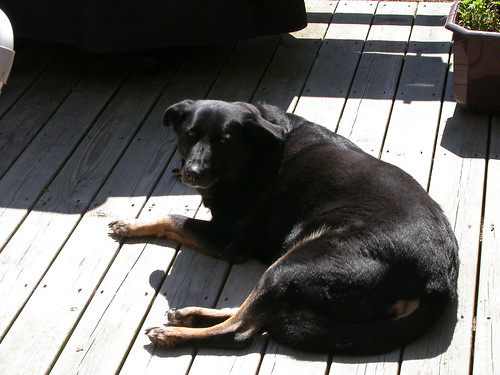
One of my co-workers
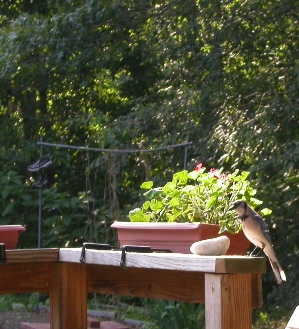
Another co-worker, tamed by the nuts I leave on the rail, who joins me on a regular basis
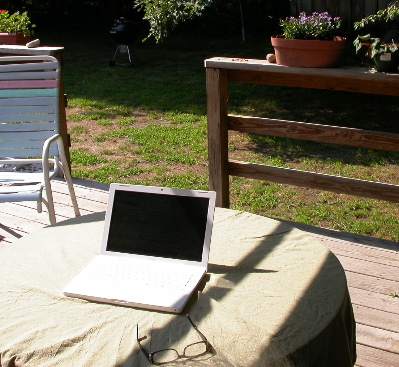
My particular paradise
Sunday, June 03, 2007
ONE QUESTION: Welcome Guest Blogger, Beryl Singleton Bissell
I have sat here for about an hour trying to write one simple sentence that describes Beryl Singleton Bissell's memoir, The Scent of God. But Beryl's unsparing honesty with herself, with her Church, with the people in her life, and even with her God, refuse to allow me a glib or easy description.
The Scent of God is the story of a young woman so filled with passion and yearning that she enters a cloister at age eighteen. It is also the story of the human desire that challenges, but ultimately enriches that love. It is a rich, sensual, and marvelously told tale by a woman who leaves the religious life, but never stops embodying its virtues: humility, faith, and above all, joy.
I do not have the perfect sentence to describe The Scent of God, but when I looked on the book cover , I found that Ann Patchett captured its spirit with extraordinary precision:
"A terrifying, passionate, and exalted examination of what it means to love with your whole heart..."
Yes, that's it exactly. And is there any more important quest?
This is the first time I’ve been asked to blog on someone else’s blog – Patry’s no less. I’d feel like an intruder save that Patry invited me and as you love her and I love her, we most likely have things in common and I’m excited to be here and thank you for staying to visit.
When we discussed this book blog tour event, Patry suggested that I talk a bit about how life in the cloister” prepared me “for the solitary life of a writer.” Although I’ve been asked many questions about my book, and how I wrote it I’ve never fielded this question before. I’ve been mulling it over for several days now, wondering how best to answer as its complexity surprised me and I was stumped. In cases of “stump” I go do something else like take a walk or attempt to finish the hat I’ve been trying to knit for two years or I head to the kitchen (a place I normally avoid because I’d much rather write than cook). Yesterday, as it was the first warm and sunny day we’ve had here on the North Shore of Lake Superior where I live, I decided to garden and had such a grand time grubbing around in the earth planting bright annuals and weeding out dandelions that I stayed outside until the black flies appeared in search of supper.
As I gardened I mulled over Patry’s question of how cloistered life prepared me for the solitary life of a writer and realized that I was having difficulty because the cloister had both positive and negative qualities and the negative contained modifiers.
The first “how” that comes to mind is the way we lived in the monastery. For those of you who might not know much about cloistered or monastic existence one of its underlying tenets is the importance of silence. Silence provides the monk or nun with a “place” to live in the presence of God. The cloister walls provide the seclusion, the rule of silence provides the atmosphere, and the quieting of the mind creates the actuality. So here, in this one word “silence,” as practiced in monastic life, we have several factors at work: structure, solitude, silence (what I refer to as the 3 S’s)
I believe that good writers need all three S’s to turn out good pieces of work. I didn’t realize the 3 S’s importance as a writer until I had the opportunity to go away for two weeks to a writing retreat for women. There, separate from my daily life, living in silence, and having structured writing time, I wrote more in two weeks than I had during the two prior years.
Many writers will tell you the same thing. Like the monk or nun who leave the world to seek a place apart in which to find God, writers do their best work in a place away from or separate from their homes (a room of one’s own). In that room they are not distracted by the daily (dog, duty, diapers, dianthus, disasters etc). Alone they confront the empty sheet of paper, silent they listen to their muse, structured they work at their writing. I have a writing shed next to the garage with no access to phone or internet. It is there that I write what I cannot write elsewhere.
So what about the negative impact of cloistered life on me as a writer? Here it is in all its brazen contempt. In the cloister I lost my voice. By voice I mean not the use of tongue and vocal chords but the loss of the ability to think things through. To have opinions that might differ from those of others. To express doubt. To challenge belief. To search for one’s own truth.
This loss of voice should not exist in cloistered life. It does not belong in a place dedicated to the God of truth. So, here is where I must insert those modifiers that I mentioned earlier. I didn’t lose my voice because of the cloister but because I was a cloistered nun in the 60s when thinking for oneself was not permitted. Our superior did all our thinking for us and in obeying her we were obeying God and because I was a woman in a pre Vatican II Catholic Church which placed little value on women’s role save as “servant of.”
I didn’t realize how much I missed having a voice of my own until I returned to the world and had to start thinking for myself, where I was frightened and hesitant to express myself. I maintained silence, was timorous and obedient and docile -- and I was angry and I didn’t know why.
During the process of learning how to write, I discovered that a very strong voice of my own lay tucked deep within me. It took a long time-- 20 years apprenticeship learning to express myself -- to summon that voice. And now that I’ve found my voice again and have learned to use it, I nourish and encourage it through the practice of the 3 S’s of Silence, solitude, and structure.
Thank you Patry for inviting me to do this guest blog with you, and thank you Patry fans for your willingness to welcome me today. I shall check back here throughout the day to comment and reply.
**********
The Minneapolis Star Tribune named Beryl as a "Best of 2006 Minnesota Authors." Her book The Scent of God was a “Notable” Book Sense selection for April 2006 and has been nominated by booksellers for a Midwest Booksellers Book Award. Visit her Website.
Monday, May 28, 2007
TOMORROW NIGHT
They call it a reading; and yeah, when we get together in New York tomorrow night, Tish Cohen and I are probably going to do some of that. But mostly, we're going to talk informally about life, writing, and friendship.
Lies (the downfall of my characters) and phobias (the torment of hers) may also come up.
If you've ever read anything Tish has written--from her fabulous new novel, Town House, to a blog post over at The Debutante Ball or even a laundry list, you have some idea just how funny and wise and all round wonderful she is.
When: May 29th, 7 p.m.
Where: Borders, Park Avenue, New York
Why: Talking to each other is fun, but tomorrow night Tish and I want to talk with you.
Sunday, May 13, 2007
TALKING TO NEWBORNS
It's mother's day, and it seems, I have a grandson. His name is Hank David Richard Francis after various family members, but you can just call him Hank.
I was nineteen when my first son was born, and so inexperienced that I didn't dare remove his sweater when I brought him home for fear that I'd break one of those twig-like arms. Sometimes it seems like a miracle that we both survived.
But one of my most closely guarded secrets is that even after four children, I still feel like that when I handle an infant. I can't resist a baby once they have weight and solidity and can laugh and play, but a fragile newborn? Were my own really THAT small?
I can no longer remember how to wrap a baby in a receiving blanket, and I was a total failure at getting Hank to burp, but I absolutly love talking to newly born humans. And for at least an hour, that's what I did. I talked to Hank.
I told him about all the things I hoped he and I would do together someday. I resurrected the old stories I'd made up for the other beloved children in my life. I pointed out the open fields and the the light came through the trees behind us, and the sound of the children whose play he would soon share, mingling with the river that runs behind his Uncle Josh's house.
And I wished for him a world that would always be as good and abundant and full of love as the one in which he found himself yesterday, blinking and beset with new hungers, but already listening. Already eager to hear and learn and know.
Sunday, May 06, 2007
BLOGGER'S BLOCK
I'd like to say I've been suffering from Blogger's Block, a real and serious condition worthy of capitalization, and maybe even a listing in Wiki. But unfortunately, I don't believe it exists.
Even its more famed and deadly cousin, Writer's Block, seems to me like a dressed-up name for fear. Or laziness. Or procrastination.
Or maybe it just means you really don't want to write at all. You want to think about writing--a much less taxing activity, that has never taken the life of a tree, or bored a single reader.
So no, I haven't had Blogger's Block. Instead, I've been conducting an unplanned (and highly successful!) experiment on the principle of Inertia.
So much of what I learned in grade school is lost forever, as I first learned when I tried to help my kids with their third grade math homework. Division of fractions? Huh? Did I ever do that? And how about diagramming a sentence? I'm sure there's a good reason to learn to do it, but I never knew what it was.
But I can still remember the morose Mrs. M. (who tippled in the paper closet,) teaching us that:
A body in motion remains in motion,
while a body at rest remains at rest
until acted upon by an outside force.
It has the kind of sing-song rhythm that made it memorable for those of us more inclined to poetry than science. If, say, the theory of relativity could have been encapsulated in a similarly catchy phrase, I might actually understand it.
But back to the scientific principle of Inertia. In life, it means something like 'if you don't begin your diet or your novel or your exercise program today, you're even less likely to begin it tomorrow...' And if you ignore your blog for five days or more, it soon becomes "a body at rest," stuck indefinitely on a poem about a bad mood.
Very interesting, no? I think it was Picasso who said that he painted every day because if he took a day off, he might never do it again.
There's a lesson in that, and now that I'm in motion again (I think), I just might take it.
Tomorrow: Changing Light
Friday, April 13, 2007
3 Posts in 1 Day? Am I losing it?

No, it's just Poetry Thursday. And since Blogger has prevented anyone else from talking here, by cutting off the comments, it looks like I better keep the conversation flowing all by myself. So here it is: a poem I wrote when I was in Oregon for the first and only time:
BAD MOOD IN OREGON
The March trees
are different here
on the other coast.
Along Route 5,
they point upward
like intractable feathers.
Only the internal weather
travels with us
wherever we go--
layer after layer
of illusory greys.
Look deeper, the sky says.
Wake up!
If you knew
you would die today,
would these clouds
be your final vison?
3 GOOD REASONS TO THROW MY COMPUTER INTO THE SEA...and 5 even better reasons not to
Pros:
1. For some reason, ever since I converted to beta blogger, I haven't been able to get onto a lot of my favorite blogs. The New Dharma Bums, The Writers Group Blog, and just today Grow Wings, to name a few. Meanwhile, other Blogger sites, continue to welcome me and serve up their beautiful sights and colors. Some even offer me tea; I swear it's true!
Another strange aspect of this situation? It only happens on MY computer. On Ted's computer, I can sign in as myself and visit any blog I'd like. So who's promoting this conspiracy? Blogger? My Mac? The government, maybe? I don't know, but my seagull friend and I are getting plenty aggravated.
2. At present, I'm working very hard on my second novel. At least, I'm trying to. I mean I intend to...doesn't that count for something? Every morning I wake up and commit to writing at least 2,000 words. I write my goal in my journal. I look myself in the mirror, bravely facing my bedhead, and make a solemn promise: Today I will...I swear I don't even laugh when I say it. By noon, I've revised downward to 1,000. But do you think this blasted computer can produce even a thousand measly words on a regular basis? I tell you; it's time for a new one.
3. There are far too many interesting sites on this computer. I need one that squawks like a seagull whenever I try to visit blogs or read the 10 most emailed articles on the New York Times, or to check the obits before I get my work done. Maybe a little ruler could pop out and slap my hand. On my next computer, I definitely want a squawking seagull and a ruler.
And now for the cons, which are really pros, if you get my tangled logic. In the past week, I've been incredibly happy and grateful to receive three Thinking Blogger Awards. (I hope no one will tell these kind people that the only thing I've been thinking about much later is how I can procrastinate doing my work.)
The first was from Colleen, whose blog has made me love with Floyd, Virginia so much that I'm now telling everyone I know I want to move there. (My impudent friends and family claim that I say I'm moving to a different location every year, and I barely get out to the corner store. Hmmph, will they be surprised when I send them a postcard from Floyd.
Then the marvelous Tinker, who draws and makes things, and reviews books with The Third Day Book Club and always, always inspires me with her generous spirit, chose me, too.
And just today, I saw that a new friend, Aaron Lazar, who writes provocative essays, as well as suspense novels that are definitely on my to-be-read list, tapped me.
Thanks to all! (I was also going to say "I love you," but realized that might sound a little too overzealous, and besides, Aaron's wife might get the wrong idea.)
In turn, I'm supposed to choose 5 blogs that make me think. The trouble is that I wouldn't consider adding a site to my sidebar if it DIDN'T provoke thought and joy and maybe even a little bit of transformation. And as you can see, there are considerably more than five of you wonderful people hanging out among my links.
So instead of following the rules, I decided to choose five NEW blogs that make me think. Since I was planning to update my links anyway, this was a great opportunity.
1. eSoup: I was introducted to this inspring and informative blog through KG's fabulous weekly series for writers. It happens every Tuesday on Write Now is Good; and for anyone who's interested in increasing their writing productivity (ahem) it's a must-read. (Note to self) Just do your writing BEFORE you check out the blog.
2. The Palace at 2:00 a.m. Marly is an inspired fantasy writer and poet, and I never leave her blog without feeling a little more awake and alive than I was when I clicked on it. Seriously speaking--or maybe whimsically speaking, you need to read this blog.
3. The Happiness Project: because happiness is good, right?
4. Mardougrrl: All right, I know everyone in the blogosphere has been visiting this exceptionally well-written and insightful blog for months and years. I'm slow, okay?
5. Just Be...Connected: It's not just a blog; it's a community of people committed to the creative lifestyle who share ideas and interviews, and sometimes even STUFF. What's more Just Be has planned an amazing conference to be held right here on Cape Cod in the hotel where I used to sling hash, er, I mean serve elegant dinners. (Really, the food is good, and if you come, you will get to meet all my cool waitress friends.) If you haven't yet registered, may I remind you that October is the very best month on the Cape, and there is such a generous spirit behind this, that it has to be wonderful.
Monday, April 02, 2007
The Weekly One Line Obituaries
"magic fly paula," a photographer whose work draws me to it again and again, calls this "Blue Words from the Silent World." It seems to fit.
I usually like to find six obituaries before I stop my search, but these five
contain enough for one week.
As always, I will confine myself to one line about each person, but there was a story about Olive Dehn which seemed so poignant to me that I have to share it: She loved her hens so much that she never left her cottage unattended, for fear a fox might get one of them. At one point, there had been eighty hens, but in the end, only one remained. Dehn gave it away to a friend a few days before she died. I'm not sure why that story touches me so much, but it does.
The rest of these lives spoke to me in different ways. Gilly Singh Mundy, who worked tirelessly and humbly for social justice, but loved a great party, reminds me to celebrate more. And the the line about Maha Ghosananda who lost sixteen siblings in the Khmer Rouge massacre is so hopeful it sings. But enough from me; let the blue words speak.
Olive Dehn, Poet, writer, organic farmer for 40 years:
" Dehn was forever cooking, feeding, and comforting, as well as opening the house to people in need." (Or maybe it would suffice to say she loved hens?)
Don McPhee, Photojournalist:
"He found grace, courage, and dignity in unlikely places." (This is a man worth learning more about...)
Cormac Rigby, BBC Radio Announcer and Catholic Priest with a passon for ballet:
"He was in every sense a good man."
Gilly Singh Mundy, community activist, who dedicated his life to the fight against racism and injustice:
"His beautiful photographs and his love of music and food were an expression of his passion for life; he threw legendary parties."
Maha Ghosananda, Cambodian peace worker:
"For all his learning and his mastery of ten languages, he built his work on a belief in the transformative power of inner peace."
Wednesday, March 28, 2007
MY WHOLE LIFE CHANGED WHEN...
Those are storyteller's words, the kind of words that make you slyly tilt your head to steal the essence of someone else's conversation if you happen to overhear them in public. Or of if spoken directly to you, they are words that invite you to lean closer, to listen more deeply, to prepare to hear a secret.
The first time I heard them was in a wondrous little restaurant called The Good Harvest Cafe in Crescent City. Marilyn had recommended it, and since I was in her home town, I knew I wouldn't be disappointed. The huevos rancheros with avocado were the best ever.
But this isn't a post about food. This is about Serious Life Transformations, and the occasional necessity of eavesdropping to get them.
While Ted read the paper, I sipped my coffee and took in the scenery. The couple at the next table were middle-aged, and appeared to be on some kind of a date. Their body language was restrained, and they were telling each other their lives, as people do in that situation. Condensing. Highlighting. Perhaps embellishing a little.
Finally, the man said, "My whole life changed when I decided that every time I was tempted to complain about the state of the world, I would stop and do something instead. Even if it was something really small."
He then described how he'd moved into a subdivision where everyone drove bicycles instead of cars, and started some kind of solar company. (I'm fuzzy on the details, but being an eavesdropper, I wasn't allowed to ask questions.)
I'm not sure what his date who was eating buckwheat pancakes with no syrup and water thought about his story, but the eavesdropper who was devouring her huevos and sipping coffee from a huge mug has been thinking about it ever since. And in some small, but amazing way, my life was changed, too.
The second time I heard those mystical words was in Chicago at one of those sparsely attended readings that writers are supposed to find so humiliating. But if there had been more people present, I might never have gotten to hear Heather's story about her years in the peace corps in Bulgaria.
My whole life changed when I saw how people dealt with hardship in that country. If the power went out, which it did frequently, or they couldn't get where they wanted to go, or things didn't go their way, they didn't fume or yell at someone or wring their hands like we sometimes do. They just dealt with it. Living among them, I felt like I grew up.
Hmm...now that I think about it, her story wasn't all that different from the man in the Good Harvest Cafe.
And once again, my life changed subtly in the hearing of it.
The third time was also in Chicago (obviously a profound city) when a guest at my friend Susan's party told me her life had changed when her husband retired and decided to take a Great Books Course.
As the books he consumed altered, and excited her husband, the wife found herself growing hungry for what he had. She entered college and earned a degree in English Literature. Her only motive? A love of learning and an avid desire to open herself to the transformation truly great books offer.
So here it is, the existential question of the week: When was the last time your whole life changed?
Saturday, March 24, 2007
10 thoughts about THE KITCHEN
1. When I looked around for an interesting kitchen photo, I found a startling abundance of sexy ones. Naked people ambling across the linoleum. Women in lacy lingerie sprawling on the granite countertops. That kind of stuff. I wonder why...is the kitchen in the sexiest room in the house--or the one where sexiness is most forbidden?
2. Yellow is a very good color for kitchens. If I were queen, I would order all kitchens painted yellow at once.
3. Every kitchen should have a kitchen table, even if it's a little one where you can sit in a bathrobe with a cup of coffee and a notebook in the morning and look out at the birds.
4. My kitchen doesn't! (The queen would like that rectified at once.)
5. My favorite item in the kitchen is a little bench my father made for my kids when they were little. The only one who sits on it now is me.
6. It's good to contemplate the world from a little bench on the kitchen floor every now and then.
7. I hate the idea of having a TV in the kitchen. If I were queen, I would forbid it. If you want noise while you're cooking, the queen insists you have to sing.
8. In my grandmother's kitchen, breakfast was a three course meal: first fruit, then oatmeal (the slow cook kind), then fried eggs and toast. She always sang when she prepared it, too.
9. The best kind of floor is the black and white checked kind that I so admired in Laini's kitchen. Along with no TV, and no walking naked through the kitchen (unless it's late at night and you're really hungry) and mandatory kitchen tables for all, and singing even if your voice is really bad, the queen would order black and white checked floors for everyone. And a little bench where the cat can come up and brush against your knees. Don't forget the little bench.
10. If everyone sang while they made their oatmeal, it would not only taste better, it would lower cholesterol 22% more than it already does. Exactly 22%. If you don't believe me, the queen will commission a survey to prove it.
10 and a half: Once, just once, I want to wash dishes wearing shoes and socks like the ones in the photograph by Brittney Bush! Now that's sexiness in the kitchen. And look at the yellow!
Tuesday, March 20, 2007
NINE INCREDIBLE DAYS: Where to begin?

Years ago, when I was expecting to become a bestselling author at any moment, I read up on book tours. I hadn't much thought about the minor details, like say, sitting down and writing a book, but I had the ten-city author tour planned in intricate detail.
And since this was important to me, I retained a lot of what I read, too. Unfortunately, just like all the advice I've absorbed about organizing your life or reaching Nirvana in ten easy steps, knowledge doesn't always translate into action.
Conventional Wisdom: Don't overpack. Bring simple, coordinating items that hold their press.
What I did: Pack absolutely everything I owned, and then mostly wore my jeans and a favorite black sweater (rumpled, of course.)
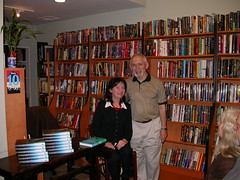
("The sweater" and me with Ed Kaufman at M is for Mystery)
Conventional Wisdom: Eat light, high protein meals that will give you an edge. Since you'll probably be eating crappy hotel food anyway, you might want to pack some trail mix.
What I did: Gorged myself in some of the best restaurants I've ever visited.
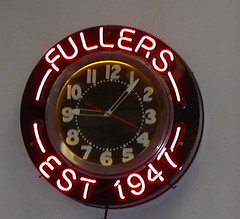
(The clock at Fuller's in Portland where the hash browns, the easy banter among patrons at the counter and the atmosphere definitely made breakfast the most nutritious meal of the day.)
Conventional Wisdom: If you're a debut author, be prepared for the humiliating experience of reading to crowds of two or three at bookstores.
What I did: Okay, a couple of times, you might say the crowds were less huge than I might have hoped. But I took that as an opportunity to really get to know the amazing few who turned out. As a result, I thoroughly enjoyed every experience.
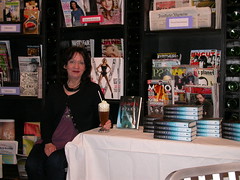
(With Irish coffee in Chicago on St. Patrick's Day. I really should have been wearing green, but I couldn't resist the lure of the black sweater...and besides, I've got the proverbial map of Ireland on my face.)
Conventional Wisdom: Separated from your family and friends, your days on the road can be a lonely experience.
What I did: Traveled with my husband, and met up with the most wonderful, generous friends a wandering writer ever had in every place I visited. Lonely? Not for a minute.
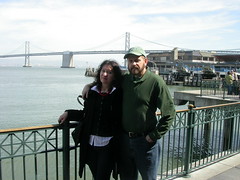
Conventional Wisdom: A book tour is a grueling experience, but it will further your career. Keep your eyes straight ahead, and you will get through it.
What I did: Keep looking upward. Otherwise you might miss out on the wonder and amazement.

Special thanks to everyone who made my book tour the experience of a lifetime:
Sky and her wonderful husband for an amazing day in Seattle, and one of the finest dinners I've ever had.

Laini and Jim who hosted a delightful party in Portland. Unfortunately, I forgot my camera that night, but Laini has some great shots on her blog. Thanks, too, to Alexandra, Neil and Sophia, and Maggie! Leroy also made a huge impression and kept me from missing my dogs quite so much.
Marilyn who shared her hometown, acted as my personal tour guide to the wonders of California, and planned a terrific party with her friends.
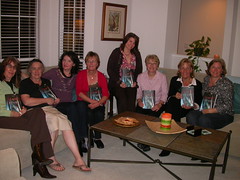
Marc Lecard, the first member of Killer Year I've had the pleasure of meeting in person. Thanks to Marc and his wife Jane for coming out after a long day's work--and also for a couple of great restaurant recommendations. Both The Stinking Rose and The House of Nanking were divine.
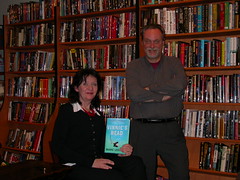
(Holding Marc's terrific new novel, Vinnie's Head which garnered a starred review in Publishers' Weekly, and was a Booksense pick for March)
The fabulous Jordan Rosenfeld who combined a Liar's Party with a bookstore reading for a uniquely wonderful event at BookSmart in Morgan Hill. Thanks, too, to Cinda and Brad for their warm welcome and everything they did to promote the event.
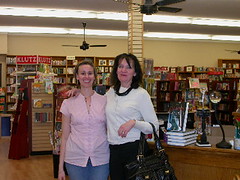
(Please click to get a better look at Jordan's terrific smile. But oh-my-god, where is my black sweater?)
Heather, who inspired me with her conversation--not to mention treating me to the best cupcake I've ever had at The Book Cellar in Chicago.
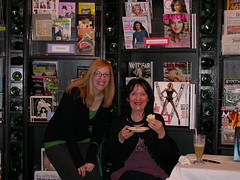
And Susan Messer, who introduced me to a fascinating group of new friends at an afternoon Liar's Bash, and with her husband, Jim, brought Chicago to life for Ted and me.
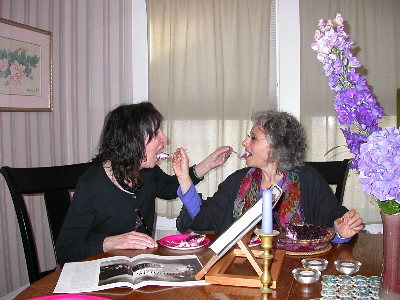
(Feeding each other the special blueberry pie we bake for our muses every August. This year we expect great things.)
Wednesday, March 07, 2007
You almost feel like you could fly without the plane...
Photo by addicted Eyes who also supplied title for this post and a quote that describes exactly how I feel. Click on the image to see more of his work (and some more great quotes, too.)
“It is the greatest shot of adrenaline to be doing what you have wanted to do so badly. You almost feel like you could fly without the plane.” -Charles Lindbergh
So this is what's happening. In a little more than twenty-four hours, I'm
leaving on my own funky book tour--a combination of readings at
some truly fantastic and unique book stores, and Liars' Parties with my amazing blog friends. (Expect lots of pictures.)
What's more I'll be visiting incredible cities that I've longed to see all my life, but never have.
I'll be looking at a different ocean and contemplating the world from an entirely different perspective. I have no doubt my soul will be rocked like a boat.
I'll also be visiting a city on a lake that's so impressive, it looks like an ocean. For the first time in my life, I'll be drinking my St. Paddy's day pint in a pub that's far from New England.
I'll be meeting some of you, who I've come to know so well here in the sphere.
Even better, Ted is going with me.
If any of you are near these areas and have a chance to come and see me, I would be thrilled to see you in person.
The where and when:
Seattle Mystery Bookshop
March 10th
Noon-2 p.m.
Book Passage
Corte Madeira, CA
(Drop by signing, but if you're in the area...)
March 14th
10 a.m.
M is for Mystery
San Mateo, California
March 14th
7-9 p.m.
Booksmart
Morgan Hill, CA
March 15th
6 p.m.
The Book Cellar
Chicago
March, 17th
Noon
On the 16h I fly to Chicago, and then home on the 18th. Till then, it will probably be pretty quiet around here.
Now maybe I better start thinking about packing...
Sunday, March 04, 2007
ALL ABOUT SMOKING
* First of all, let me say something about the photo, which was taken by the outstanding New York photographer known as Noam Galai. I'm reasonably certain that the man in the photograph (who looks like Bob Dylan to me, but is probably--or almost definitely--NOT) is smoking nothing illegal. Just wanted to make that clear.
Now for the question which inspired this post, taken from an intriguing meme on Zhoen's blog.
Have you ever smoked heroin?
1. No.
2. I probably wouldn't be announcing it on the worldwide web if I did.
(They arrest you for that kind of stuff, don't they?) Then again, I tend to be pretty naive. If I had heroin for breakfast, I'd probably be feeling the need to confess here and now.
And 3. They smoke it? Really? I thought they just "shot" it. Hmm...If I ever was going to use heroin in any form--which would probably only occur if I was terminally ill or all my loved ones were killed in a train crash--smoking it sounds more appealing than the vein-popping method.
The truth is I've never smoked much of anything. I never got the hang of inhaling noxious stuff into my lungs, and whenever I tried, I ended up embarrassing myself by choking, sputtering and hacking in front of the friends I was trying to impress with my cool.
It wasn't from lack of trying either. Growing up in a mill town, the art of cigarette dangling was practically de riguer. By the time I was thirteen, everyone I knew was packing Marlboros in their jacket pocket. I tried to cave in to peer pressure; really I did!
Unfortunately, like the much-ridiculed ex-President, I never inhaled. I did do a hell of a good imitation though (and I'm willing to bet that Bill did, too).
The good news is that faking it is not addictive, and I never got hooked. The bad news--if there is any bad news in NOT developing a deadly habit--is that my friends quickly tired of lending me their butts.
In other words, it was a short-lived phase.
When a joint was passed in college dorm rooms an at concerts , I quickly learned that pretending was even more necessary to my image than it had been when I snuck a feigned smoke outside the middle school. Fortunately, the light was provided by a candle or otherwise dimmed--or maybe everyone else was so high they didn't notice.
A few times, despite my ability to really inhale the stuff, I actually thought I was high, too. I giggled, I got the munchies--the whole routine. Now I'm left wondering if it was more a testament to the power of imagination than the trace narcotic I got from puffing.
I'll never know. But I do know how you tell a real smoker from a faker: We may puff, but we never purchase--particularly not when cash is scarce and the objects of my real addiction--chocolate chip cookies (!)--were available at the all-night snack bar.
Interestingly enough, most of my characters are mad smokers. But then, living in one of my books, has got to be pretty stressful. They are, after all, suspense novels.
The good news: my characters are among the most resilient and determined people I know, and every one of them is trying to quit...Maybe by the time I reach book #5 or 6, it will be a smoke-free world.
Saturday, March 03, 2007
THE DEAD FATHER'S CLUB
There are books you read, and then there are books you inhabit. For me, The Dead Fathers Club was in the latter category.
In the course of reading this novel, I lived in the mind of a sensitive, funny, complicated eleven year old boy who's struggling mightily with the sudden loss of his father.
I lived over the pub his father used to own, but which was now being taken over by the dreaded Uncle Alan; and I nursed my secret suspicion that Uncle Alan was after more than the family business. When he started putting his hand on my mother's bum and buying me a Playstation, my worst fears were confirmed.
If grieving over a father who appears regularly as a highly demanding ghost, and trying to protect my mother from Uncle Alan weren't enough, I also had to worry about everything else eleven year-olds agonize over: getting picked last on the soccer team, being bullied at school, and deciding whether or not I should kiss the girl who had the most beautiful red-brown hair I'd ever seen.
At first, to be honest, I wasn't sure I wanted to live in the mind of an eleven-year-old boy, nevermind one with so many troubles. The first two or three chapters, I wondered what I'd gotten myself--and the huge membership of the Third Day Book Club--into this time. Was this a children's book I was reading? I checked the cover art skeptically.
As it turned out, it was a people's book. You could read it if you were eleven, but you could enjoy it if you were eighty, too. (And yes, it is like The Curious Incident of the Dog in the Night-Time in that sense.) The deeper I went into it, the harder I found it to emerge. And when I did? I found myself thinking in the voice of the young protagonist.
I won't say more, because I don't want to spoil the marvelous, complex and surprising conclusion for anyone who might read it. But I will say I loved this book. In fact, I enjoyed it so much that I kept talking about it at my readings this week.
A couple of times, my helpful husband had to poke me and say, "Excuse me, but aren't you supposed to be promoting The Liar's Diary?"
So, oh yes: Read The Dead Father's Club, and that other book with the punchy title? Read that, too. Rumor has it they're both fantastic.
Other reviews of Matt Haig's novel:
Friday, March 02, 2007
PEOPLE CONTINUE TO DIE...
...and leave behind astonishing stories and inspiring legacies that just beg to be captured in the one-line obituaries.
While searching through Flickr for a photo to illustrate my post, I found this one, which was posted by Brian Schuetz. (Click photo to see more of his work.)
I'm not sure when Tommy Williams died or where he lived, but reading about him in the early hours of March 3, 2007, his life once again had resonance.
Keith Kyle, historian and writer: "He was devoid of guile and incapable of envy."
Alan McDiarmid, scientist and Nobel laureate, speaking for himself: "I am a very lucky person and the harder I work, the luckier I seem to be."
Mai Ghoussob, Publisher, writer and artist: "She was without compromise, but she always cared for everyone."
Job Bwayo, renowned scientist and AIDs researcher, killed in a carjacking: "Bwayo had a towering physique, a smile for everyone, and an expression that gave hope to all."
Celia Franca, dancer, choreographer and teacher: "If I was born to anything, it was to start a ballet company and boss people around."
Howver, Thomas Williams, who made the caretaking of graves into a solemn avocation, come upon by accident on Flickr, was the one who made it hardest to choose a single line .
There was this: "He had never required the services of a physician or a dentist in his life."
And this: "Grief stricken families found in him a sympathetic listener."
Or perhaps it is the simplest line of all that says it best: "Mr. Williams was a kindly man."
Wednesday, February 21, 2007
THE EXISTENTIAL QUESTION OF THE WEEK
There's one thing I've really missed since I've gotten kind of busy, traveling from bookstore to bookstore, and marveling that my book is here! and there! and sometimes even that other place, too!
What I've missed is the existential question. Or more specifically your responses.
I particularly missed the Existential Question when I came upon a rather strikingly named blog in which the blogger posed a question about how our parents' deepest beliefs formed--or provided a contrast to--our own.
Much as I was tempted to uproot the question and replant it here, I won't. But it did get me thinking about a lot of things. For instance:
1. How much fun it is to blame your parents for everything that's gone wrong in your life when you're young. (Did those callous people ever stop and think about how their actions were effecting your future mental health?)
And:
2. How much less fun it is when your children start doing it to you! (Don't they realize you did the best you could? After all, you're only human!)
Anyway, this question isn't about who's to blame. It's about who did something really great and why and what it is.
So here's the question: What's the one thing your parents did absolutely right in raising you?

